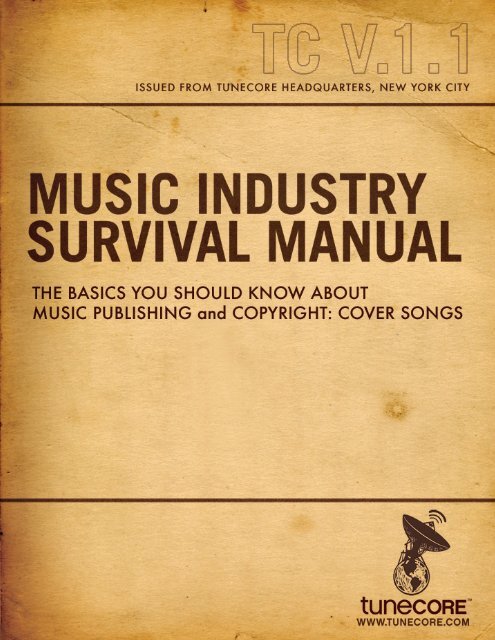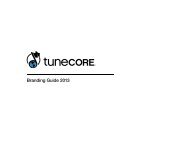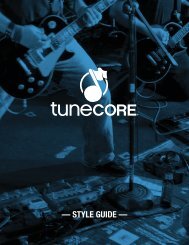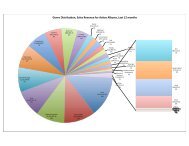Music Publishing and Copyright: Cover Songs - TuneCore
Music Publishing and Copyright: Cover Songs - TuneCore
Music Publishing and Copyright: Cover Songs - TuneCore
Create successful ePaper yourself
Turn your PDF publications into a flip-book with our unique Google optimized e-Paper software.
1<br />
THE BASICS YOU SHOULD KNOW<br />
ABOUT MUSIC PUBLISHING AND COPYRIGHT: COVER SONGS<br />
BY KEN GOES, FORMER MANAGER & PUBLISHING ADMINISTRATOR<br />
for THE PIXIES<br />
IMPORTANT: The information in this section is not intended<br />
as legal advice.<br />
This section is about music publishing. <strong>Music</strong> publishing is about the<br />
ownership of songs. <strong>Music</strong> publishing is about the rights of songwriters<br />
<strong>and</strong> song owners. And perhaps most importantly, music publishing is<br />
about money.<br />
<strong>Music</strong> publishing can be complex <strong>and</strong> confusing. Our aim here is to<br />
simplify the most basic concepts of music publishing as they relate to<br />
“covers.” <strong>Cover</strong>s are normally songs written by established artists like,<br />
for instance, “Yesterday” by The Beatles. But covers don’t have to be<br />
popular songs. A cover can be a song that has been recorded by an<br />
unknown artist. The important thing to remember is that any song which<br />
you record that was written <strong>and</strong> previously recorded by someone else is<br />
a “cover.”<br />
is it a ‘sound recording’ or a ‘composition’?<br />
The first thing we have to underst<strong>and</strong> is that a song<br />
<strong>and</strong> a recording of a song are two different things.<br />
They are two distinct properties. These two properties<br />
are called the “sound recording,” (sometimes<br />
called the “master”) <strong>and</strong> the “composition,” (sometimes<br />
called the “work”). <strong>Music</strong> contracts of all types use these terms to<br />
designate one or the other.<br />
Here we are mainly interested in the “composition.” The common everyday<br />
word we use for “composition“ is the word song. In the following,
whenever you see the word song, you can think composition <strong>and</strong> whenever<br />
you see the word composition, you can think song. These two words<br />
are synonymous <strong>and</strong> are used here interchangeably.<br />
Like all property, these two<br />
properties, the “sound recording”<br />
<strong>and</strong> the “composition,” come with<br />
rights. Just as you have a right to<br />
determine who uses your personal<br />
property, owners of the “sound<br />
recording” <strong>and</strong> owners of the “composition” (song) have the right to determine<br />
who uses their property.<br />
Who owns what? Let’s see by way of the following examples. Let’s say<br />
you record the Beatles’ song “Yesterday,” probably the most covered<br />
song in history. Since you have made the recording, you own the property<br />
called the “sound recording,” that is, your particular recording of the song.<br />
But the recording is a cover of a song. You did not write the song. You<br />
do not own the song. The song is owned by the Beatles, (or more likely a<br />
music publishing company, but more on that later). The song or “composition”<br />
is also property.<br />
Another example : Let’s say three separate b<strong>and</strong>s record the song “Yesterday.”<br />
We still have only two properties : three of one kind : the “sound<br />
recordings,” <strong>and</strong> one of the other kind : the “composition.” To sum up, we<br />
have the “composition” <strong>and</strong> we have the “sound recording” of the “composition.”<br />
Two separate properties.<br />
intellectual property<br />
These kinds of property are called “intellectual property.” Other kinds<br />
of intellectual property are books, movies, paintings <strong>and</strong> so on. And, as<br />
mentioned earlier, these properties come with rights. The particular right<br />
you have to your “sound recording” <strong>and</strong> the particular right the Beatles<br />
have to the “composition” is called a COPYRIGHT. A copyright is the right<br />
to reproduce or make copies. This right is granted by the United States<br />
2
3<br />
<strong>Copyright</strong> Law <strong>and</strong> similar laws in other countries. If you would like to<br />
learn more about the United States <strong>Copyright</strong> Law, please go to:<br />
http://www.copyright.gov/circs/circ1.html#wci<br />
Only the owner of the song has the right to reproduce or make copies of<br />
his or her song. The owner also has the right to grant permission to others<br />
to reproduce or make copies of his or her song. So, before you can record<br />
<strong>and</strong> make copies of someone else’s song, you need to get permission from<br />
the owner. You get that permission by getting a license, just like you get<br />
permission to drive by obtaining a driver’s license.<br />
This license is called a mechanical license. By getting this mechanical<br />
license from the songwriter or from a music publishing company acting on<br />
behalf of the songwriter, you will then have permission to record, reproduce<br />
or make copies of the song.<br />
publishing companies<br />
A word about music publishing companies <strong>and</strong> the ownership of songs<br />
- The songwriter is the owner of the song. But most songwriters do not<br />
look after the rights to their songs. Issuing licenses for the use of a song,<br />
collecting the royalties, accounting, etc. is a lot of work. This kind of work<br />
is called administration. In most cases, songwriters have music publishing<br />
companies do this administration for them. But in many cases, the<br />
songwriter sells the song to the music publisher. In this case, of course,<br />
the music publisher is the owner of the song <strong>and</strong> the rights that go with it.<br />
But whether the music publishing company owns the song or administers<br />
the rights to the song on behalf of the songwriter, the music publishing<br />
company will issue the mechanical license.<br />
To sum up : getting a mechanical license gives you permission to reproduce<br />
(copy) the song. Of course, in using <strong>TuneCore</strong>, the song is being<br />
reproduced digitally, but it’s the same principle : every time someone<br />
downloads the song, a copy is made.
who gets paid<br />
For every copy sold, the songwriter or publisher must<br />
be paid. The amount required to be paid for the sale<br />
of each copy of a “composition” is called the mechanical<br />
royalty. The royalty rate is established by the<br />
<strong>Copyright</strong> Royalty Board of the Library Of Congress;<br />
a government agency empowered by Congress to determine<br />
the royalty rate. The royalty rate set by the<br />
<strong>Copyright</strong> Royalty Board is called the “statutory rate.”<br />
Statutory is a fancy legal word meaning required by law. So, the rate set<br />
by the <strong>Copyright</strong> Royalty Board is the statutory mechanical royalty rate.<br />
The current statutory mechanical royalty rate that must be paid to the<br />
song owner or publisher is 9.1 cents ($.091) per copy. When you record<br />
a cover song, every time that recording sells, you owe the songwriter or<br />
publisher 9.1 cents. All mechanical licenses will specify this rate. Sometimes<br />
the rate is specified in pennies; otherwise the license will specify the<br />
“statutory rate.” In some cases, you can negotiate with the songwriter or<br />
publisher for a lower rate, but unless you can demonstrate that you will<br />
have enormous sales, the likelihood of getting a lower rate is slim. Finally,<br />
the rate does not remain static or permanent. In fact, as I write this in<br />
February 2008, the <strong>Copyright</strong> Royalty Board is considering a change in the<br />
statutory rate.<br />
compulsory licenses<br />
A word about the “Compulsory License.” You may have heard of something<br />
called a “compulsory license.” The U. S. <strong>Copyright</strong> Law allows you to<br />
get a “compulsory license” in lieu of getting a mechanical license directly<br />
from the publisher or songwriter. But this method is a lot more work. Using<br />
this method entails specific requirements for notifying the song owner<br />
<strong>and</strong> stringent requirements for accounting. And you will still pay the full<br />
statutory mechanical royalty rate. It is not recommended that you try this<br />
method. The best <strong>and</strong> easiest way to get a mechanical license is from the<br />
songwriter or the publisher directly.<br />
4
5<br />
synchronization licenses<br />
We hope that’s clear, but we’re not quite<br />
done. Now, let’s say you want to make a video<br />
of your recording of “Yesterday.” You’ll<br />
need another license. This license is called<br />
a “synchronization license.” This “synch license”<br />
gives you the right to synchronize the<br />
“composition” (song) with visual images. The<br />
synch license also contains the same right<br />
as a mechanical license; the right to make copies. But the synch license is<br />
not a substitute for a mechanical license. The only reproductions or copies<br />
you can make with a synch license are copies of your video containing<br />
the “composition.” And, depending on how you want to use the video,<br />
you may be restricted as to how many copies you can make. For instance,<br />
if you want only to have your video broadcast on TV, the internet,<br />
cell phones, etc., you may be restricted to making copies for just that<br />
purpose. But if you also want to sell your video over iTunes or anywhere<br />
else, you must have that right specified in the license. A synchronization<br />
license is a lot more fluid <strong>and</strong> flexible than a mechanical license, so when<br />
you get one, be sure you know what you want to do with the video <strong>and</strong><br />
make sure you ask for those rights to be included in the license.<br />
You get a synch license the same way you get a mechanical license. You<br />
must contact the publisher or songwriter. There is no set royalty rate for<br />
a synch license. It is all negotiable between you <strong>and</strong> the songwriter or<br />
publisher. You can negotiate to pay a one time up-front fee or pay a royalty.<br />
The royalty rate will be the amount agreed upon between you <strong>and</strong><br />
the publisher for the sale of each copy. In some cases, you may have to<br />
pay both an up-front fee <strong>and</strong> a royalty, or an advance against future royalties<br />
<strong>and</strong> subsequent royalties once the advance is paid off. It all depends<br />
on your negotiations with the publisher.<br />
The mechanical right, the synchronization right; these, along with others,
like the reprinting of lyrics, are called publishing rights. This is music<br />
publishing.<br />
your friend, the harry fox agency<br />
A word about The Harry Fox Agency. The Harry Fox Agency is a giant<br />
agency that also administers music publishing rights, though they do not<br />
issue synch licenses nor do they grant permission to reprint lyrics. Just<br />
like music publishers act on behalf of songwriters, The Harry Fox Agency<br />
acts on behalf of songwriters <strong>and</strong> publishers too. In many cases, they will<br />
be the source you will go to for a mechanical license.<br />
so who owns the songs?<br />
At this point you are probably asking yourself : How do I find the owner<br />
or publisher of a song? Just about every song in existence is registered<br />
with either ASCAP, BMI or SESAC. ASCAP, BMI <strong>and</strong> SESAC all have<br />
web sites that you can search to find the owner or publisher of a song.<br />
Remember, there are many songs with the same title, so be sure you are<br />
identifying the right song. If you know who wrote the song, it will make<br />
your search a lot easier. Once you have found the right song title <strong>and</strong><br />
writer, the information regarding the owner or publisher will be there<br />
alongside it. Another good site that will help you track down the administrator<br />
of a song is the Harry Fox Agency web site called SongFile. By<br />
visiting these web sites <strong>and</strong> doing a little detective work, you will, in most<br />
every case, find out who you must<br />
contact in order to get a license.<br />
The license will be very specific<br />
about who to pay, how often<br />
you must pay <strong>and</strong>, of course, the<br />
amount to be paid. Good Luck.<br />
6
7<br />
BE YOUR OWN RECORD LABEL<br />
BY TUNECORE<br />
Get worldwide distribution of your music into iTunes, <strong>and</strong> more.<br />
Plus marketing & promotion to drive sales <strong>and</strong> awareness.<br />
Anyone who makes music can have a career without a<br />
record label, they can just “sign” themselves through<br />
<strong>TuneCore</strong>.<br />
Digital stores like iTunes allow all music to be in stock &<br />
have sold over 2 billion songs with more than 1/2 of the<br />
sales from non-major label artists.<br />
Go to <strong>TuneCore</strong>.com.<br />
Get 100% of the royalties.<br />
Keep all your rights.<br />
SOME ARTISTS WHO DID IT<br />
Unsigned artist Kelly sold over 400,000 songs on<br />
iTunes <strong>and</strong> has over 40 million views on YouTube.<br />
iTunes ®<br />
Over 400,000 songs delivered.<br />
Over $6 million dollars earned by <strong>TuneCore</strong> customers.<br />
nine inch nails: ghosts i-iv<br />
delivered by tunecore to amazon mp3<br />
“<strong>TuneCore</strong> made the process of putting our music<br />
out effortless <strong>and</strong> transparent. Truly one of the<br />
greatest services of the modern recording industry.”<br />
-- Jim Guerinot, manager, Nine Inch Nails<br />
Eric Hutchinson sold over 120,000 songs in three weeks<br />
on iTunes <strong>and</strong> went to #1 on the Billboard Heatseekers.
GET MARKETED & PROMOTED<br />
BY TUNECORE<br />
<strong>TuneCore</strong> promotes to digital stores —<br />
over 200 customers have been featured in iTunes.<br />
The opportunity to be included in the <strong>TuneCore</strong> <strong>Music</strong><br />
Staff Picks newsletter — with a direct link to buy the<br />
album — sent to over 4 million people each month.<br />
<strong>TuneCore</strong> customers have the opportunity to have<br />
their music played <strong>and</strong> tagged in over 215 Guitar<br />
Center stores nationally.<br />
<strong>TuneCore</strong> customers have the opportunity to have<br />
their albums featured in the Guitar Center catalogs<br />
reaching over 2M people a month.<br />
Over 400,000 songs delivered.<br />
Over $6 million dollars earned by <strong>TuneCore</strong> customers.<br />
Go to <strong>TuneCore</strong>.com.<br />
steve vai<br />
“<strong>TuneCore</strong> is a forum that allows ANY artist to make<br />
their work available in all major online stores, <strong>and</strong> even<br />
have control over the marketing. Soon, we won’t be<br />
able to imagine the world without it.<br />
I haven’t been this excited since I discovered my<br />
whammy bar.”<br />
roger o’donnell of the cure<br />
“I’ve been promoting <strong>TuneCore</strong> to every musician <strong>and</strong> b<strong>and</strong> I<br />
meet, the hardest part of the sell is that people think it’s too good<br />
to be true, well it’s not, it’s true <strong>and</strong> it’s good!”<br />
steve terebecki of white denim<br />
“We were pretty bummed about ripoff splits that most of the digital<br />
music companies offer. We were head over heels about <strong>TuneCore</strong>’s<br />
super low yearly rate. Then, a rep emailed us <strong>and</strong> asked us if we<br />
wanted to play a show for CMJ. It’s not only the best deal for digital<br />
music, but they’re a bunch of sweeties too!”<br />
8






